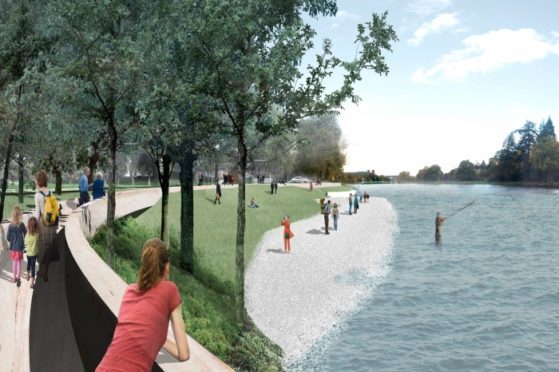The controversial £240,000 My Ness public art project for Inverness riverside will now go ahead – but will not see another penny of public funds.
Councillors approved the troubled project following an acrimonious special meeting – meaning it will be completed within the next 18 months.
The project, formerly known as The Gathering Place, was given approval after city members were told of potential financial penalties and loss of reputation to Inverness in the public art world.
Last month, Highland Council halted work pending today’s meeting amid critics’ accusations of secrecy and lack of transparency.
There are three current public art projects, My Ness, the children’s water feature and Rest Space, which form part of an overall £750k programme.
The council also refused to accept a 2,300 signature petition by protest group Open Ness who were demanding the projects be brought before the relevant planning committee rather than made in closed committees under delegated powers.
The meeting saw booing and cheering from around 30 people, for and against the project, in the public gallery, and acrimonious personal attacks on each other by councillors.
The meeting’s convener, Inverness provost Helen Carmichael, at times struggled to reign in the ill-feeling.
She told the meeting: “I firmly believe we have reviewed, scrutinised and conducted the business of this working group as we were tasked to do by this city.”
Mr MacWilliam called the council administration ‘a shower’, saying that he had received a letter from leader Margaret Davidson which ‘had the air of a court summons’.
He said: “I will return it to the sender. I will not be intimidated and neither will the people I represent. The people of Inverness deserve a lot better than this.”
He was supported by a group of six opposition councillors including Glynis Campbell-Sinclair who demanded a straight answer to whether an environmental impact assessment (EIA) had been carried out on the section of river designated for My Ness.
To booing from the public, council officers eventually conceded that there had been no EIA for the area, because they were not required to do so under EIA regulations.
They said they had consulted the relevant authorities.
Rare consensus was achieved when councillor Emma Knox pointed out that accessibility for wheelchairs, push chairs and walking aids had not been considered in the My Ness design.
She said: “A wheelchair user might get down the path, but there is no turning space.”
She asked for the local access panel and access groups to have the opportunity to comment.
Council leader Margaret Davidson said: “This will connect more people with the river, locals as well as visitors. I will sit on it and appreciate it over time.
“I hope something vilified will become something precious.”
Mr MacWilliam moved that the riverside arts working group should be disbanded and all decisions referred back to the City of Inverness area committee.
He sought all projects be suspended to allow for a full external audit of the projects finances and contractual liabilities.
Against the provost’s motion to complete the project within 18 months and to budget, his amendment lost by 15 votes to seven.
Open Ness protestors Helen Smith and Evelyn Grant said they were disappointed but not surprised by the decision.
Ms Grant said: “What we would both hope is that the officers and members go away and reflect on how they got to this point which has been an unholy mess.”
